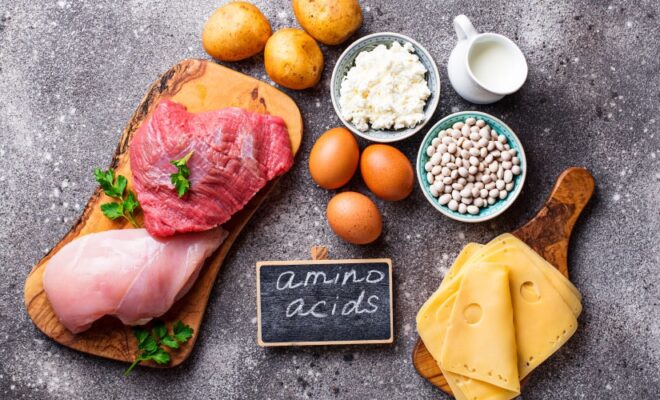Amino Acid: Benefits & Food Sources

Amino acids are an important part of a healthy diet. They are essential in the body’s metabolism, growth, and repair processes. Amino acids are found naturally in many foods, including meats, fish, beans, eggs, dairy products, nuts, and seeds. Getting enough amino acids in your diet is important for optimal health.
Eating a variety of foods from the following list can help you get adequate amounts of essential amino acids:
- Meat, poultry, and fish: All provide complete proteins that are high in all nine essential amino acids
- Dairy products: Cheese, yogurt, and milk offer good sources of protein and essential amino acids
- Beans and legumes: These plant-based foods are rich sources of essential amino acids
- Nuts and seeds: Almonds, walnuts, cashews, pumpkin seeds, and sesame seeds contain some essential amino acids
- Soy products: Tempeh, tofu, edamame, and soy milk provide high-quality sources of protein and essential amino acids
- Quinoa: This whole grain is a complete protein, meaning it contains all nine essential amino acids
One of the known amino acids is beta-alanine. It has been linked to enhanced athletic performance and improved muscle endurance. Beta-alanine can also be found in foods like beef, pork, chicken, fish, eggs, dairy products, and some plant-based foods such as oats, brown rice, and quinoa.
Getting enough of these essential amino acids can help your body to function more optimally. Eating a balanced diet rich in amino acids can keep your body healthy and strong. Supplements containing essential amino acids are available if you need an extra protein boost. Remember to consult your doctor before taking any supplements, as they may not be right for everyone.
To understand more about beta-alanine, you need to have answers to the many pending questions about beta-alanine. These are some of the questions with their respective answers:
1- What are the benefits of beta-alanine?
Answer: Beta-alanine has been shown to increase muscle endurance, reduce fatigue and lactic acid build-up during exercise, improve athletic performance, and enhance muscle mass.
2- Is beta-alanine safe?
Answer: Yes, when taken in moderation. Always read the label and follow the recommended dosage.
3- What should I look for when buying a beta-alanine supplement?
Answer: Look for a supplement free of additives, fillers, and artificial ingredients. Also, ensure it has been tested for purity and safety by an independent lab. Additionally, check to see if the FDA has approved the supplement.
4- Are there any possible side effects of taking beta-alanine?
Answer: Beta-alanine is generally well tolerated. However, some people may experience tingling sensations in their faces, hands, and feet when they take high doses. This side effect is called paresthesia, which usually goes away after a few weeks of taking the supplement.
5- What foods contain beta-alanine?
Answer: Beta-alanine is found in beef, pork, chicken, fish, eggs, dairy products, and some plant-based foods such as oats, brown rice, and quinoa.
6- What is the recommended dosage for beta-alanine?
Answer: The recommended daily dose of beta-alanine ranges from 2 to 5 grams. However, some athletes take up to 10 grams per day. It’s best to consult your doctor before taking any supplements.
By eating a balanced diet with adequate amounts of essential amino acids and understanding more about beta-alanine, you can work towards maintaining optimal health and wellness. Be sure to consult your doctor before taking any supplements, as they may not be right for everyone.


